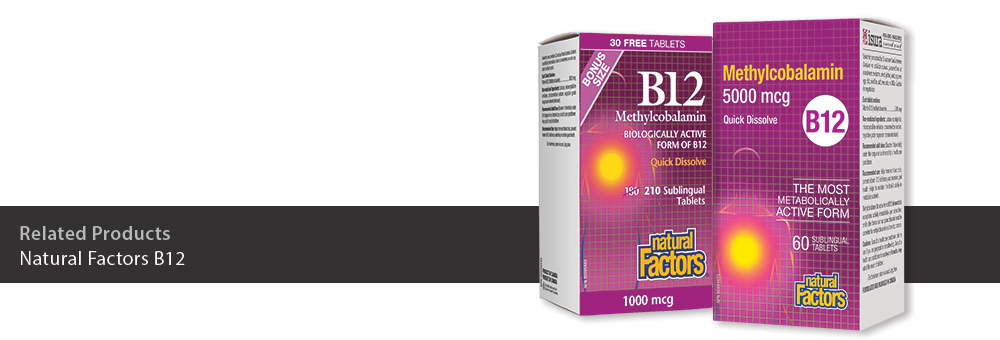

Benefit from B Vitamins
B vitamins are essential to maintaining overall health because of their role as coenzymes in many of the body’s processes. Your body relies on B vitamins to help metabolize carbohydrates, fats, and proteins into energy. You also need them for red blood cell formation, normal growth and development, healthy brain function, cardiovascular health, and to build proteins.[i]
The challenge with B vitamins is that they’re water soluble and easily depleted by the body, meaning that you need to consume them daily. The liver needs to convert standard B vitamins from food and supplements into their active coenzymated forms in order for your body to be able to use them. This process is inefficient and especially difficult for people who lack the genetic makeup to absorb standard forms of B vitamins.[ii] As a result, B vitamins are often excreted before the liver can convert them into their active forms.[iii]
Coenzymated B vitamins are “active”
Preformed coenzymated B vitamins are already in their biologically active forms and do not need to be converted by the liver. The body can use them immediately upon absorption to support a range of essential physiological processes, even in people with impaired B vitamin metabolism. For example, L-5-methyltetrahydrofolic acid (L-5-MTHF) is a metabolically active and coenzymated form of folate (vitamin B9). This form allows for a higher folate uptake and helps increase blood folate levels more effectively than regular folic acid.[iv]
Which B vitamins do you need?
There are eight different B vitamins, which can be confusing when choosing a supplement. Along with supporting nutrient metabolism and maintaining good health, each B vitamin has its own specific function.
Vitamin B1 (thiamine) supports healthy nerve function and is needed for normal growth and energy production.1 BioCoenzymated™ Benfotiamine contains a fat soluble and more bioavailable form of B1 than water-soluble thiamine.
Vitamin B2 (riboflavin) is needed to activate other B vitamins, including folate and vitamin B6, and to convert tryptophan to niacin (vitamin B3). It is a good choice for people concerned about their homocysteine status (a risk factor for heart disease).1 BioCoenzymated Riboflavin 5’-phosphate contains an active form of vitamin B2.
Vitamin B3 (niacin) plays an important role in cardiovascular health and promoting good (HDL) cholesterol levels.1
Vitamin B5 (pantothenic acid) supports cardiovascular health, healthy cholesterol and triglyceride levels, and lipid metabolism.[v] BioCoenzymated Pantethine contains the active form of vitamin B5.
Vitamin B6 (pyridoxine) helps in tissue formation and is often recommended for women with nausea and vomiting during pregnancy.[vi] BioCoenzymated Pyridoxal 5’-phosphate contains the active form of vitamin B6.
Vitamin B7 (biotin) promotes strong, healthy hair and nails.[vii] It also plays an important role in the health of your skin.
Vitamin B9 (folate) is critical for supporting normal early fetal development and is an important supplement for women of child bearing age.5 BioCoenzymated Methylfolate plus Methylcobalamin contains (6S)-5-methylteteahydrofolic acid (MTHF) Quatrefolic®, the active form of folate, and methylcobalamin, the active form of B12.
Vitamin B12 (cobalamin) helps maintain normal function of the immune system and is especially important during times of increased stress. Its role in iron use and red blood cell formation makes it an important B vitamin for anyone at risk of anemia.1 BioCoenzymated Methylcobalamin & Dibencozide contains the two active forms of vitamin B12.
Who needs vitamin B 12?
Vitamin B12 can be depleted by stress, poor diet, certain medications, and alcohol use. Vegans, vegetarians, people with malabsorption issues, and older adults are often lacking vitamin B12, making daily supplementation critical.2 Anyone dealing with stress can also benefit from daily supplementation to compensate for the body’s greater needs.
Vitamin B12 deficiency can cause fatigue, poor appetite, constipation, and tingling in the hands and feet. If left unaddressed, deficiency can lead to irreversible nerve damage, anemia, and elevated homocysteine levels.
Natural Factors’ line of Methylcobalamin supplements contain the active form of vitamin B12. The convenient one-per-day sublingual tablets are great for older adults and those who lack the stomach acid needed to absorb regular B12. Methylcobalamin is available in 1000 mcg, 5000 mcg, and 10,000 mcg concentrations so that you can choose the most suitable potency based on your age, health, and dietary needs.
Active B Complex also contains 500 mcg of vitamin B12 in a full spectrum of coenzyme B vitamins alongside Farm Fresh Factors™, a bioenergetic blend of phytonutrients, for active support of energy metabolism.
Absorbable vitamin B support
A daily vitamin B supplement can help prevent deficiencies and support your overall health. Natural Factors’ line of coenzymated B vitamins are highly absorbable, conveniently formatted, and made from gluten-free and non-GMO ingredients.
References
[i] Mikkelsen K, & Apostolopoulos V. B vitamins and aging. In J.R. Harris & V.I. Korolchuk (Eds.), Biochemistry and Cell Biology of Aging: Part 1 Biomedical Science. 2017; Singapore: Springer.
[ii] Kennedy DO. B vitamins and the brain: Mechanisms, dose and efficacy—a review. Nutrients. (2016); 8(2):68.
[iii] Meshkin B, & Blum K. Folate nutrigenomics: a convergence of dietary folate metabolism, folic acid supplementation, and folate antagonist pharmacogenetics. Drug Metabolism Letters. 2007; 1(1):55-60.
[iv] Scaglione F, & Panzavolta G. Folate, folic acid and 5-methyltetrahydrofolate are not the same thing. Xenobiotica. 2014; 44(5):480-488.
[v] Rumberger JA, Napolitano J, Azumano I, et al. Pantethine, a derivative of vitamin B(5) used as a nutritional supplement, favorably alters low-density lipoprotein cholesterol metabolism in low-to moderate-cardiovascular risk North American subjects: a triple-blinded placebo and diet-controlled investigation. Nutrition Research. 2011; 31(8):608-615..
[vi] Amjad UA, Maan AA, Latif A, et al. Effects of ginger and vitamin B6 on pregnancy induced nausea and vomiting. International Journal of Advanced Research. 2019; 5(1):174-178.
[vii] DiBaise M, & Tarleton SM. Hair, nails, and skin: differentiating cutaneous manifestations of micronutrient deficiency. Nutrition in Clinical Practice. 2019; 34(4):490-503.

